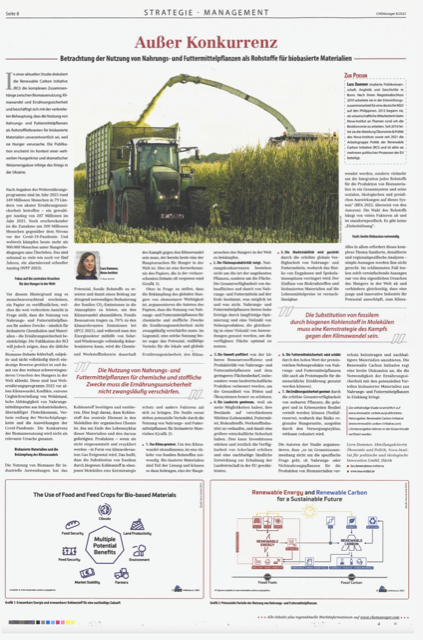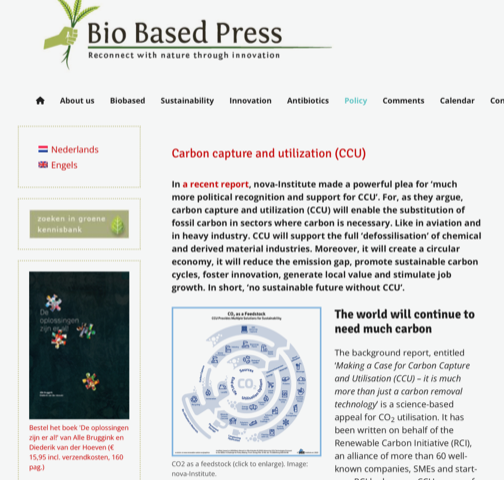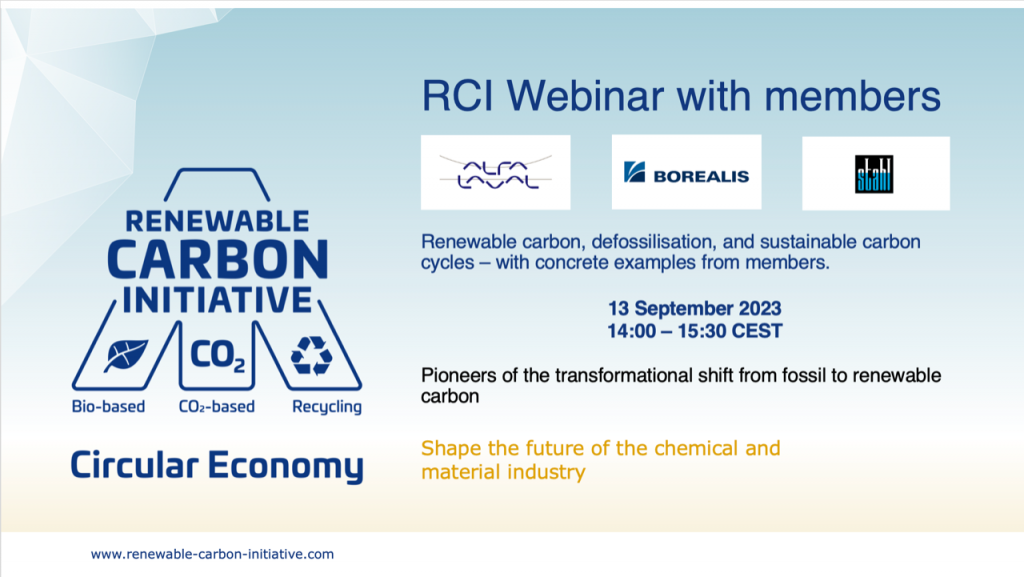Let’s take a look at what happened in August 2023 at RCI:

1) Publication of the RCI Manifesto for the next European Commission (2024-2029)
The RCI has published a Manifesto for the next European Commission (2024-2029), highlighting strategic recommendations that the next Commission after the election in 2024 should put on their agenda.
In the realm of chemistry and materials, defossilisation is imperative to meet both the climate targets and the continuous demand for embedded carbon – the carbon bound in the molecules. This can only be achieved by utilising renewable carbon sources from biomass, direct CO2 utilisation or recycling. The concept of renewable carbon establishes the foundation for a future chemistry and materials sector that can be circular and sustainable. Simultaneously, the concept helps to reduce the dependence on imported fossil feedstocks like crude oil and natural gas. To successfully execute this transformation towards renewable carbon use, political backing is essential. The RCI manifesto outlines seven core recommendations directed towards the next European Commission, which aim at translating this vision into reality.
The manifesto outlines seven key messages to policymakers to make this transformation a reality:
- Ensure that carbon embedded in chemicals and materials is given more political attention as an important factor for material-related emissions. Renewable carbon derived from biomass, direct CO2 utilisation, and recycling must become a guiding principle for policies and targets regulating chemicals and materials.
- Make a stepwise phaseout of fossil carbon from below the ground for chemicals and materials by 2050 an explicit objective.
- Enshrine the 20% target of non-fossil carbon in chemicals and plastics by 2030 from the Sustainable Carbon Cycles Communication in binding legislation and ensure implementation through concrete political action.
- Establish a Carbon Management Regulation to incentivise companies to replace fossil carbon from below the ground with renewable alternatives.
- Promote bio- and CO2-based[1] or -attributed content in parallel to recycled content in product-related regulation.
- Deploy carbon capture and utilisation (CCU) as a key strategic net-zero technology to supply sustainable and circular carbon.
- Support the transformation of existing chemical infrastructure from fossil to renewable carbon and support the transformation of biofuels plants into chemical suppliers without discriminating against existing production from renewable feedstock (including primary biomass).
[1] The use of the term CCU generally refers to the utilisation of carbon dioxide (CO2), but can also include industrial carbon monoxide (CO) sources prior to flaring or other conversions to CO2 before release to the atmosphere. In the US, CO2 and CO are grouped together as “carbon oxides” for purposes of Section 45Q CCUS tax credits. In this report, “CO2 utilisation” is meant to also include other carbon oxides.
Disclaimer: RCI members are a diverse group of companies, institutions and associations addressing the challenges of the transition to renewable carbon with different approaches. The opinions expressed in this position paper may not reflect the exact individual policies and views of all RCI members.
Voice your support for the RCI Manifesto for the next European Commission (2024-2029) now!
Click here to submit your online signature: https://renewable-carbon-initiative.com/call-for-signature-rci-manifesto/
You can download the manifesto here.
2) RCI submitted feedback to the public consultation on industrial carbon management
Through work of WG Policy, the RCI prepared and submitted feedback to the ongoing European Commission public consultation on industrial carbon management. One of the key points raised is that carbon needs to be comprehensively managed from supply to emission. As it currently stands, the initiative on industrial carbon management only addresses carbon when it is emitted to the air in form of CO2. In other words, it reduces carbon management to CO2 management. This fails to acknowledge that comprehensive carbon management from source to emission has the potential to achieve much higher climate mitigation than only addressing it at end-of-pipe, while at the same time providing much-needed carbon feedstock to essential European industries.
3) RCI executive office went to Berlin with German Government Officials
On 2 August 2023, Lara Dammer and Christopher vom Berg travelled to Berlin to meet with representatives of the German ministries. The main purpose was to discuss the ‘National Biomass Strategy’, but also the ‘Carbon Management Strategy’, and to highlight RCIs positions and arguments in this regard.
4) Recognition of RCI’s work

4a) Article in CHEManager
The well-known CHEManager magazine allowed us to cover RCI’s Scientific Background Paper on “The Use of Food and Feed Crops for Bio-based Materials and the Related Effects on Food Security – Promoting Evidence-based Debates and Recognising Potential Benefits”.
The German article by the reports lead author Lara Dammer (who also chairs RCI’s Working Group Policy and leads nova-Institut GmbH Department Economy & Policy) can be found here: https://www.chemanager-online.com/news/diskussion-um-biomassenutzung-und-ernaehrungssicherheit
The report challenges the flawed and subjective nature of the biomass debate, arguing that it diverts attention from more significant causes of global hunger such as climate change, conflict, and inequalities. It presents fresh perspectives on the biomass issue, advocating for the utilization of food crops in the chemical and material industry. One key benefit is the substitution of fossil fuels with food crops, aiding in the reduction of carbon emissions and mitigating climate change.
However, the report identifies seven potential benefits in total and emphasizes the necessity for thorough analysis rather than oversimplified claims. The report ultimately calls for balanced discussions that consider both food security and the advantages of bio-based materials from food and feed crops.
Find the entire scientific background report here: https://renewable-carbon.eu/publications/product/rci-paper-on-the-use-of-food-and-feed-crops-for-bio-based-materials-and-the-related-effects-on-food-security-recognising-potential-benefits-long-version-pdf/
4b) Article in The Wall Street Journal
Michael Carus (Founder and Executive Manager of RCI) was featured in the Wall Street Journal “Plant-Based Plastics Gain Favor as Companies Pursue Sustainability Goals – Bioplastic production is growing at a record clip amid strong demand from fashion and food-packaging companies in particular”, talking about the importance of bio-based polymers for the transition from fossil carbon to Renewable Carbon for the chemical and materials industry.
The adoption of plant-based plastics, or bioplastics, has been limited to 1% of global plastic production due to their higher cost compared to conventional fossil-fuel-based plastics. However, their production is growing at a 14% annual rate, with an anticipated 3% market share within five years. Bioplastics are derived from starch, sugar, or pulp-rich plants like corn and sugar cane. They offer environmental advantages, including reduced carbon emissions during manufacturing and potential lower pollution upon degradation. Bioplastics come in two primary types: those mimicking traditional plastics and those chemically identical to them. Approximately half of current bioplastics are biodegradable. Challenges include their economic viability against cheaper plastics and feedstock limitations. Government support and regulations may aid their expansion. Companies like Dow are exploring converting agricultural waste into recyclable bioplastics to meet the growing demand.
Find the article here: https://www.wsj.com/articles/plant-based-plastics-gain-favor-as-companies-pursue-sustainability-goals-b0ea7dd8

4c) Article in Bio Based Press – Reconnect with nature through innovation
The Bio Based Press recognized RCI’s Scientific Background Report on “Making a case for Carbon Capture and Utilisation (CCU) – It is much more than just a carbon removal technology”.
The report advocates increased policy support for Carbon Capture and Utilization (CCU), which involves using captured carbon dioxide as feedstock for industries. CCU’s potential to replace fossil carbon in sectors like aviation and heavy industry is emphasized, as well as its role in achieving net-zero emissions and supporting Sustainable Development Goals. The report stresses the need for regulatory frameworks to boost CCU and renewable carbon-based chemicals and materials. CCU is a key element in a sustainable and circular economy. RCI calls for recognition, strategic targets, and competition to drive CCU adoption, and discuss challenges related to scaling up and securing renewable energy supply for CCU processes.
Find the article here: https://www.biobasedpress.eu/2023/07/carbon-capture-and-utilization-ccu/
5) Next RCI-Webinar with members Alfa Laval, Borealis and Stahl

During the next RCI webinar on 13 September 2023, Michael Carus of RCI is going to introduce the Renewable Carbon Initiative and the Renewable Carbon Strategy, and focuses on the latest scientific background papers, position papers, and projects of the RCI. Three members of the RCI, Francesco Montecchio from AlfaLaval, Michael Costello from Stahl and Stephan Roest from Borealis will give concrete examples on renewable carbon, defossilisation, and sustainable carbon cycles.
Find out more at: https://renewable-carbon-initiative.com/events/ and https://renewable-carbon-initiative.com/media/library/
6) Welcoming our newest RCI member

Mercer (DE) International Inc. is a major European as well as global player in the forest-based industry. Next to a substantial presence in the solid wood business, Mercer International Inc., through its European subsidiary Mercer Europe GmbH, operates the German kraft pulp industry with an aggregate capacity in excess of 1 million tons of cellulosic fibres per annum. Being the largest corporate buyer and converter of industrial wood qualities in Germany, Mercer is also the largest processor of biogenic carbon in the form of lignin liquor. Today converted primarily into renewable energy with a capacity of approx. 200 MWel, Mercer is pursuing a future material use of lignin for a wide range of biogenic carbon applications.
Find out more at: https://www.mercerint.com

Beckers Group (DE), as coatings manufacturer, is a formulator with a very complex raw material and direct supplier landscape. 70% of raw materials are specialty organic chemicals often going into many competing applications in other industries. Carbon is the major raw material which today is almost exclusively derived from fossil sources. Beckers considers sustainability as the most important innovator in the industry during the next 10 years. This will generate significant business opportunities. Beckers ambition is to lead the transformation of the industry. Around 90% of Beckers product carbon footprint cradle to gate is embedded in these raw materials, the change from fossil to renewable sources is the game changer in our offer to the market.
Find out more at: https://www.beckers-group.com

SCS Global Services (US) has been a pioneer and leader in the field of sustainability standards and third-party certification since 1984, working across the economy in the natural resources, built environment, food and agriculture, consumer products and climate sectors. Partnering with companies, government agencies, NGOs, and stakeholders, SCS is striving to advance sustainable development goals through independent assessment, the application of sound science, and innovative solutions. Through these services, SCS is enabling decision-makers and purchasers to make informed decisions, giving innovators a competitive edge, and helping to drive the development of leadership standards to create a framework for continuous improvement.
Find out more at: https://www.scsglobalservices.com
Source
Renewable Carbon Initiative, press release, 2023-09-01.
Supplier
Alfa Laval
Beckers Group
Bio Based Press
Borealis Polyolefine AG
CHEManager International (Newspaper)
European Commission
Mercer International Group
nova-Institut GmbH
Renewable Carbon Initiative (RCI)
SCS Global Services
Stahl International BV
Share
Renewable Carbon News – Daily Newsletter
Subscribe to our daily email newsletter – the world's leading newsletter on renewable materials and chemicals









